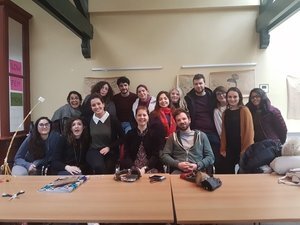Research in Groningen: Pronkjewail – third and fourth pillars.
This is the third part of a three-part piece (read the first part here and second part here).
Pronkjewail is a Doctoral Training Programme co-funded by Marie Skłodowska-Curie Actions*. This is a programme where 16 international PhD students have come to the University Medical Center Groningen at the University of Groningen to do research. All PhD students have opportunities to go on different secondments in academia and industry, and the overall goal of the project is ‘protecting patients with enhanced susceptibility to infections’. Our 16 projects are divided into four pillars: vaccines and primary prevention (1), personalized detection and infection prevention (2), iatrogenic influence on the microbiome (3) and personalized therapy/stewardship (4).
We asked all Pronkjewail PhD students to describe their research in their own words through two questions: What is your research about? and What could potentially be the future impact of your research? MindMint will be publishing the answers of PhD students working in each of the pillars.
Giuseppe, Italy
Characterization of waterborne bacteria, antibiotic resistance genes and heavy metal assoviated resistance genes through analysis of hospital-related water and human gastrointestinal tract microbiome using high-throughput sequencing technologies
The goal of my project is to investigate the presence of antibiotic resistant bacteria (ARB) in hospital humid compartments and to track the spread of multi-drug resistance bacteria and antibiotic resistance genes in the clinical environment using high-throughput sequencing technologies (e.g. shotgun metagenomics).
It is well known that hospitals are major ecological niches of ARB. The antibiotic pressure, a susceptible population (severely ill patients) and the constant “traffic” of potentially pathogenic microorganism help the dissemination and the emergence of antimicrobial resistance. Among the many sources of infection, water should be considered of particular relevance due to the numerous occasion of exposure and hospital water safety is a major priority and constant challenge for the prevention of healthcare-associated infections.
The results will be used to support prevention and improve diagnostics and detection of ARB in the clinical environment.
Paola, Italy
The effect of hospitalization and drug use on the composition of the oral and fecal microbiome
In recent years, the bacteria present in our digestive tract (gut microbiota) has been acknowledged to play an important role in the hospital recovery or in many chronic diseases. During my project I want to investigate the effect of medications/drugs and food on these bacteria.
The main goal would be to define "markers" within the gut microbiota that would allow to predict the recovery of a patient. Knowing this, patients could be treated before any surgery with beneficial bacteria (probiotics) that would boost and support the indigenous flora.
Rita, Portugal
The role of oxidative stress in mucositis of oncological patients: can supportive care with prebiotics and vitamins aimed at the microbiome reduce and prevent infections
My PhD project is focused on the development of strategies targeting the gut microbiota in order to reduce the severity of mucositis. This inflammatory disorder is one of the most debilitating side effects of cancer treatment and is characterized by an inflammation in the gastrointestinal that results in pain, nausea/vomiting and bacteremia.
This research will allow the development of nutritional interventions (e.g. pre/probiotics) that will reduce inflammation in the gut ameliorate the side effects caused by repetitive chemotherapy cycles.
Mafalda, Portugal
Monoclonal antibodies to detect or fight staphylococcal infections
Antimicrobial photodynamic therapy (aPDT) of S. aureus infections is the activation of a drug by a source of light, which together with oxygen, will inactivate the bacteria. The use of monoclonal antibodies coupled to these drugs gives specificity to the target bacteria, reducing any possible surrounding damage as side effect.
Methicillin-resistant Staphylococcus aureus (MRSA) can cause serious invasive diseases, including bacteremia, pneumonia and implanted device infections. Moreover, these infections are very hard to treat due to their high-level antibiotic resistance. Finding an alternative strategy, such as antimicrobial photodynamic therapy, which is specific, non-invasive and effective, is very appealing.
Marina, Spain
Novel tracers for the detection of bacterial infections
My research is focused on the development of new methods to rapidly diagnose infections. These methods are based on the use of fluorescently labelled antibiotics and antibodies which target the infection specifically. The goal of this research is to detect the infection in early stages by analyzing the fluorescence signal with exciting and smart technology.
The rapid detection of infections will facilitate a better and specific treatment in early stages, leading to better outcomes, less antibiotic resistance organisms and decrease healthcare costs.
Ioana, Romania
Optimized TB-care by dried blood spot (DSB) analysis and e-health
I am working on curing tuberculosis one sustainable simple solution at a time. For now, I am proving that technology, specifically eHealth works and is needed in tuberculosis management and assessing the feasibility of monitoring plasma concentrations of drugs in countries which don’t use this technology yet. Tuberculosis patients and medical staff from across the globe agree that education and communication are the two most pressing issues in tuberculosis so the eHealth app will start from there. Concerning therapeutic drug monitoring, we are hoping this will become standard of care since patients take at least 4 antibiotics for 2 months to 2 years so it’s imperative we know what the real concentrations are. The feasibility analysis will investigate not only if the technology is implementable in different settings, but will also investigate the medical and economical impacts.
Christian, Germany
Optimizing infection management for intensive care patients by antimicrobial stewardship
Severely ill patients at intensive care units have very complicated diseases and complex patient histories. When treating infections in those patients this has to be taken into account. Electronic hospital data together with data science (e.g. machine learning) can help to improve the quality of care through identifying clinical patterns and risk factors in this patient group. We are studying different approach to reach this goal. The main focus is to use these techniques to help multidisciplinary clinical teams to use the right diagnostic test and the right treatment at the right time for the right patient.
University hospitals like the UMCG routinely collect large amounts of data. Our research will help to make better use of this data to understand the complexity of severely ill patients and to improve their outcome.
* Grant Agreement number: 713660 — PRONKJEWAIL — H2020-MSCA-COFUND-2015

